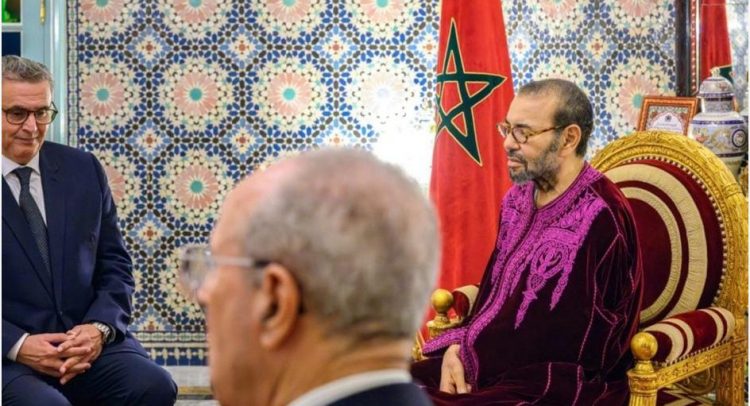King Mohammed VI on Monday December 23, 2024, chaired a working session on the reform of the Family Code at the Royal Palace in Casablanca.
The meeting was held at the end of the mission of the body responsible for revising the text, which submitted a report containing 100 proposed amendments. The Sovereign has referred the matter to the Supreme Council of Ulemas, concerning “certain proposals relating to religious texts on which the Council has issued a legal opinion”, according to a press release from the Royal Cabinet.
This meeting also took place after the King had “made the necessary arbitrations on questions on which the Council had issued more than one opinion, or those whose revision required recourse to the opinion of the Sharia, These Royal decisions have given priority to choices that are in line with the guidelines and objectives” set out in the royal letter addressed to the head of government, as well as “those set out in the rules governing the work of the Authority, first and foremost the rule of ”Do not prohibit what is authorized, nor authorize what is prohibited’’.
In line with the reform initiated in 2004, the reform of the Family Code, led by His Majesty King Mohammed VI, reflects the Royal will to strengthen and consolidate the family unit as the fundamental foundation of Moroccan society.
During this session, the Minister of Justice, Abdellatif Ouahbi, in his capacity as a member of the Authority, gave a presentation on the approach and working methodology, particularly the listening and hearing sessions, as well as the salient proposals that resulted, included in the said report.
The Minister of Habous and Islamic Affairs, Ahmed Toufiq, presented, in his capacity as a member of the Higher Council of Ulemas, the conclusions of the council’s opinion on the essential legal basis of some of the Authority’s proposals and took into account the principle of Maslaha (interest) in finding solutions in line with Sharia concerning other proposals.
“This represented an opportunity to highlight the capacity for constructive Ijtihad in deducing the rules of the Sharia, the golden mean and the moderation of the Moroccan School of Fiqh, which draws its foundations from the Kingdom’s religious constants”, the statement added.
In this context, King Mohammed VI called on the Supreme Council of Ulemas to “pursue reflection and adopt a constructive Ijtihad on the issue of the family, through the creation of an appropriate framework within its structure, with a view to deepening research into Fiqh issues linked to the changes that the Moroccan family is undergoing, and which require innovative responses in line with the requirements of the times”.
In order to clarify the main contents of the revision of the Family Code, the sovereign instructed the Head of Government and the ministers to “communicate with public opinion and keep it informed of the latest developments in this revision, which the government will ensure, within a reasonable timeframe, to develop and formulate within the framework of the legislative initiative, in accordance with the relevant constitutional provisions”.
Concerning the legislative phase of the revision of the Family Code and the debates and votes that will follow, the Sovereign recalled the references and foundations that should frame this phase, in accordance with the High Guidelines contained in the Royal letter addressed to the Head of Government.
These include, in particular, the principles of justice, equality, solidarity and symbiosis emanating from Islam and the international conventions ratified by Morocco.
To this end, His Majesty the King emphasized the need to ensure that the proposals resulting from the Ijtihad are drawn up and formulated within the framework of clear and intelligible legal rules and legislative texts, facilitating their implementation and avoiding contradictory judicial interpretations.
The working session was attended by the Head of Government, Aziz Akhannouch, the Minister of Justice, Abdellatif Ouahbi, the Minister of Habous and Islamic Affairs, Ahmed Toufiq, and the Minister of Solidarity, Social Integration and the Family, Naima Ben Yahia.
Source: MAP


